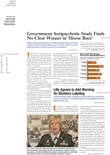The enormous devastation wrought by Hurricane Katrina has upended the lives of surviving Gulf Coast residents, and among that number are many psychiatrists. Despite their own suffering, many volunteered their medical expertise to help other victims.
APA is taking a number of steps to ensure that its members are safe and able to address the psychiatric needs of survivors as recovery efforts continue.
At the plenary session of APA's fall component meetings in Washington, D.C., APA leaders and members of councils and committees heard firsthand accounts of Katrina's destruction from a psychiatrist who fled New Orleans and went on to provide emergency medical care to other hurricane evacuees and from an APA leader who is coordinating mental health recovery efforts in three affected states.
The fall meetings were held in early September, before Hurricane Rita created more need for mental health services.
“All my worldly belongings are in a card-board box in Jackson, Mississippi, and in a red rucksack that has traveled with me for the last 35 years,” said Harold Ginzburg, M.D., J.D., M.P.H., to meeting attendees.
After first thanking a man in Jackson for lending him his suit, Ginzburg explained in harrowing detail the ordeal he and so many others have faced in Katrina's wake.
Ginzburg is a clinical professor of psychiatry at Louisiana State University's Health Sciences Center and at Tulane University Medical Center. He also maintained a private practice in New Orleans and fled the city as the floodwaters began to rise. He drove nearly 200 miles north to Utica, Miss., on the advice of a patient and wound up at a Jewish summer camp that had been turned into an evacuation center.
Practicing Resourceful Medicine
According to Ginzburg, Jacob's Camp was a designated evacuation location for several group homes for developmentally disabled people in New Orleans. Other temporary residents included relatives of people living in Utica and those who were nearly out of gas after evacuating New Orleans.
Ginzburg soon put his medical skills to work as a camp doctor. “I went back to being a general practitioner,” he said, and found himself conducting certain medical procedures for the first time in decades.
His ingenuity served his patients well. For instance, he discovered that“ industrial oxygen from a welding tank works well if you can't get medical oxygen.”
He also prescribed medications, but was limited to the medications available in small-town pharmacies in the area. “For antipsychotic medications, I had a choice of thorazine, stelazine, and Haldol—real simple.”
After treating his medical patients, Ginzburg spoke with evacuees who were emotionally despondent. He also encouraged them to talk to friends and family about what they have endured and emphasized that as psychiatrists, “we have to allow people to grieve without labeling or pathologizing them.”
At the end of August, Ginzburg began working as disaster response director of the Louisiana Psychiatric Medical Association (LPMA) and in that role helped LPMA President Jodi Holloway, M.D., assess disaster mental health efforts and coordinate psychiatric services for affected regions throughout the Gulf Coast.
Ginzburg estimated that about 60 percent of the psychiatrists working in Louisiana, most of whom work in New Orleans, have been displaced by Katrina. He is one of them.
Just a month before the hurricane struck, Ginzburg purchased a new home in New Orleans but hadn't sold his old one yet. “I am doubly homeless,” he remarked. However, he noted, he still has his health, his family, and some money in the bank. “I am fortunate,” he said.
APA Mobilizes Disaster Committee
Even before Katrina made landfall, Anthony Ng, M.D., and members of APA's Committee on Psychiatric Dimensions of Disasters had begun to contact district branches in the Gulf Coast region to see how they could be of help, he told meeting attendees.
As chair of the committee, Ng helped coordinate APA's disaster mental health efforts following the Indian Ocean tsunami and the London subway bombings.
As Katrina engulfed Louisiana and Mississippi, Ng said that the committee's list serve became information central as messages about the storm and its effects began to appear.
One of Ng's first priorities was to ensure that “district branch members working in affected areas were safe,” he said, which was difficult given that the storm disrupted phone service.
“There was no way the district branches could function after the hurricane hit,” he said. Now, it is crucial that APA help reestablish and support district branches in the affected areas, Ng noted. He urged APA members to support colleagues who have been displaced and lost their practices.
Ng said that APA, through its disaster committee, has partnered with a number of organizations to launch disaster mental health efforts. These include the Federal Emergency Management Agency, Department of Health and Human Services, AMA, and the World Health Organization, among others.
Long-term challenges for APA to address are the “tremendous psychiatric needs” of hurricane survivors, social unrest and disruption that occurred among those stranded in New Orleans, and the dismantling of mental health services throughout the Gulf Coast, Ng emphasized.
Information on APA's Committee on Psychiatric Dimensions of Disaster and its activities are posted at<www.psych.org/disasterpsych/>.▪
